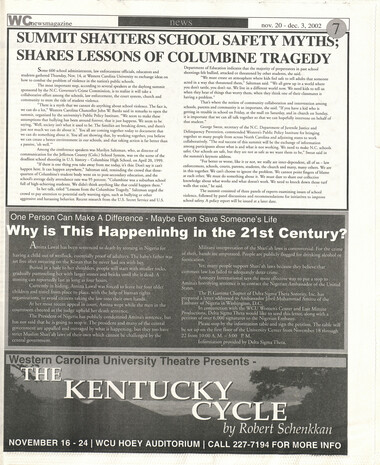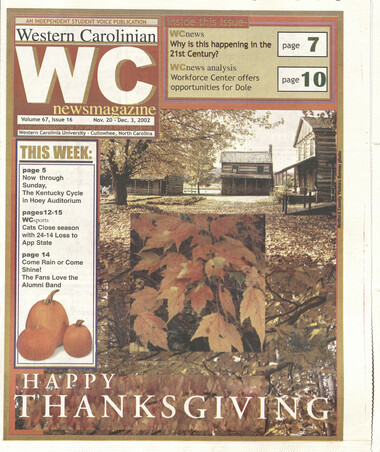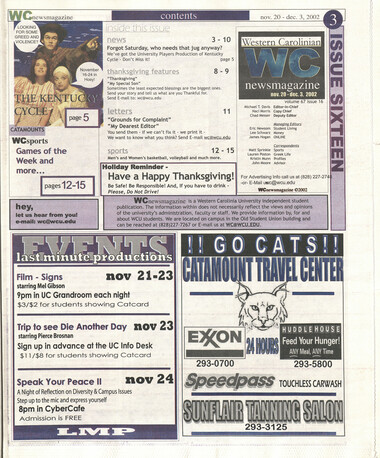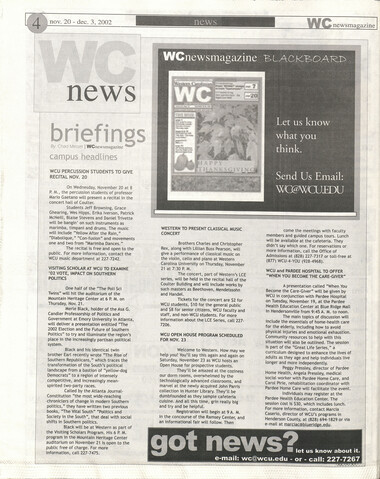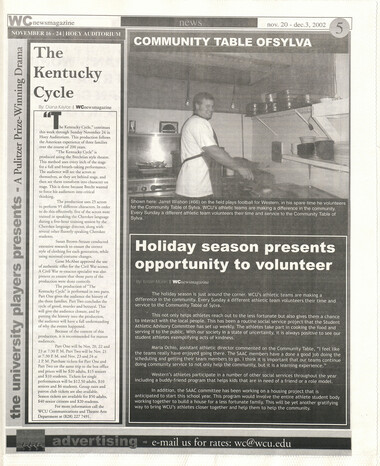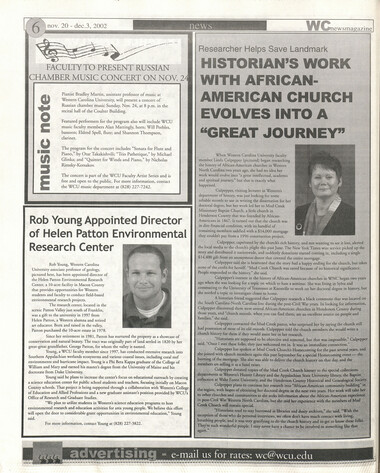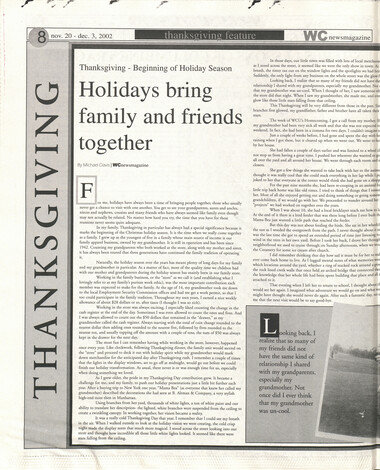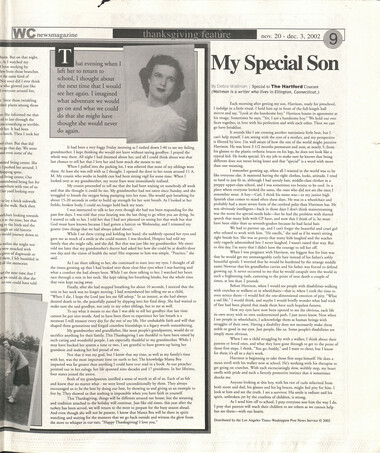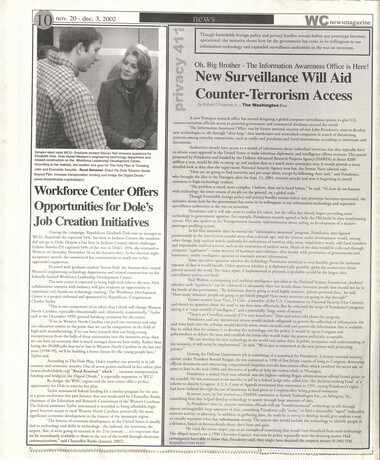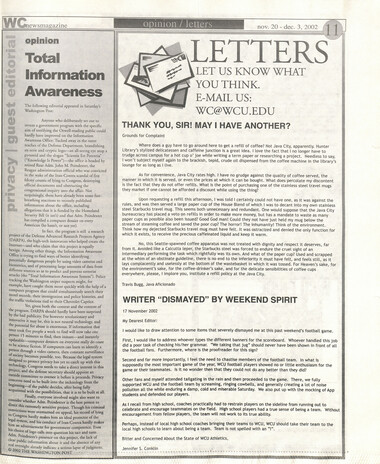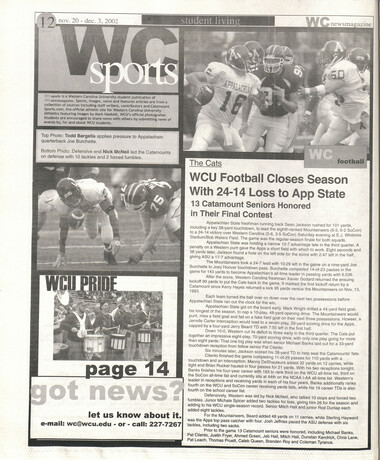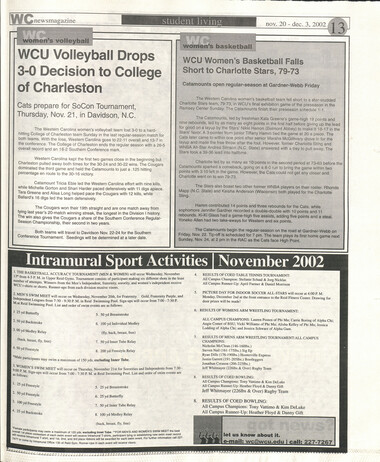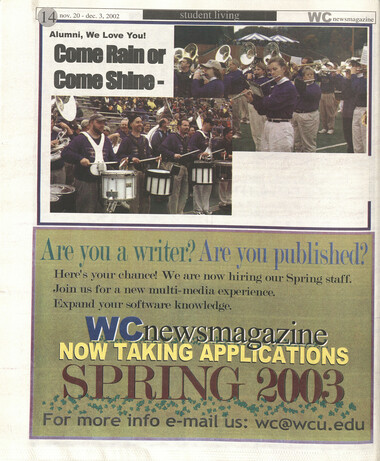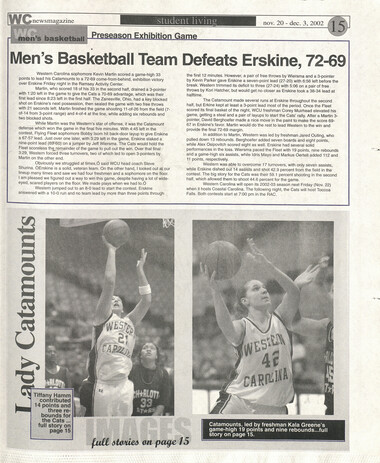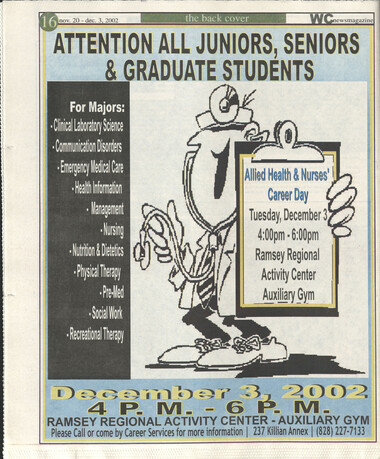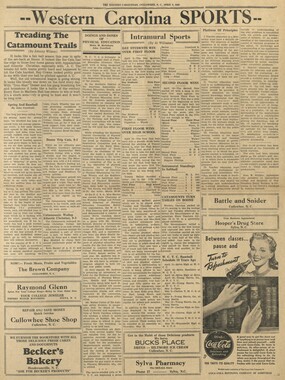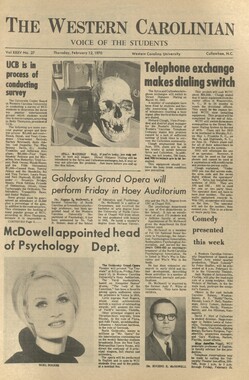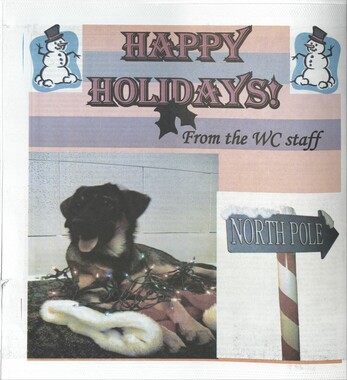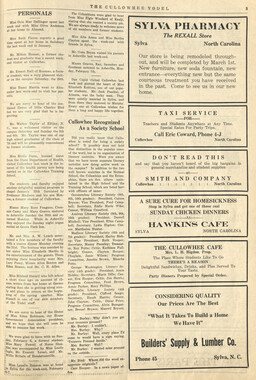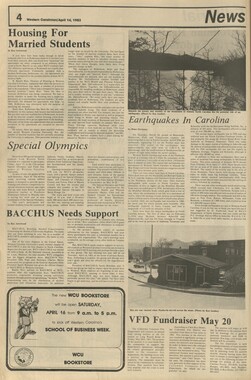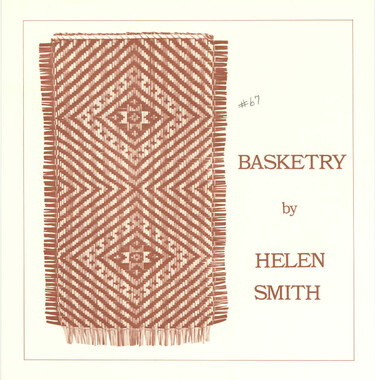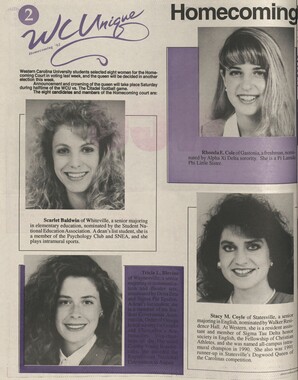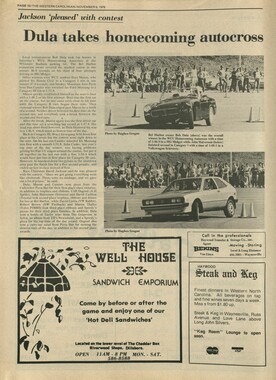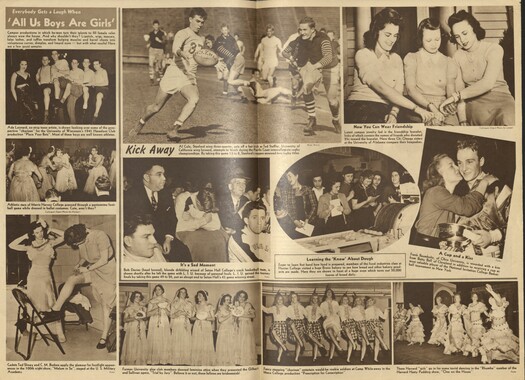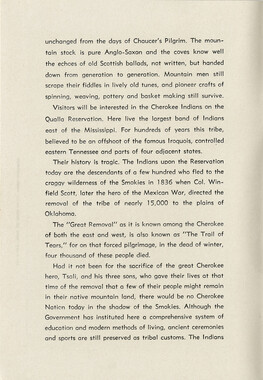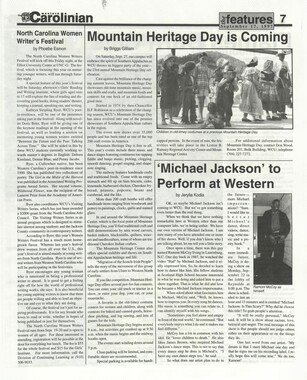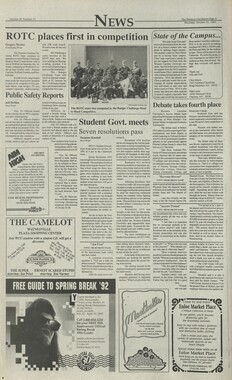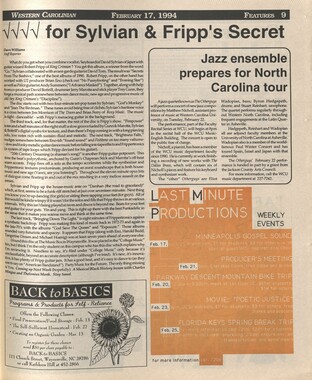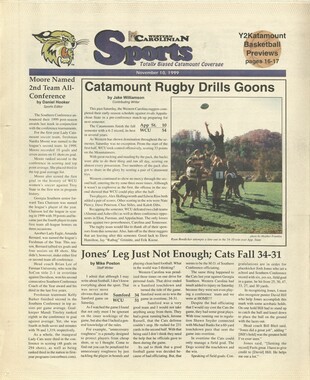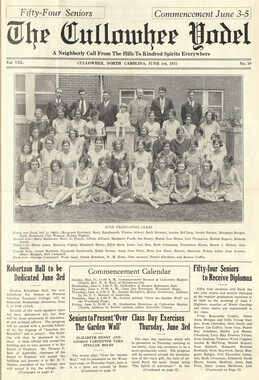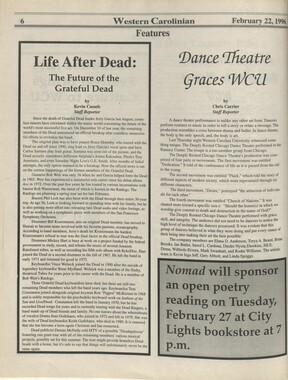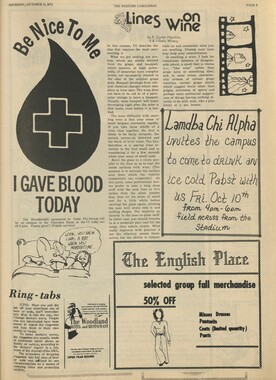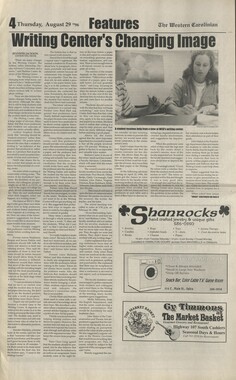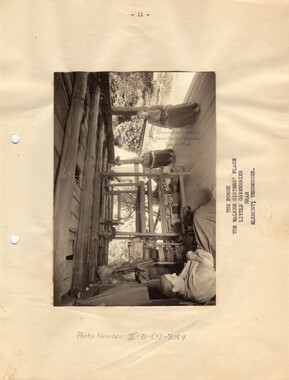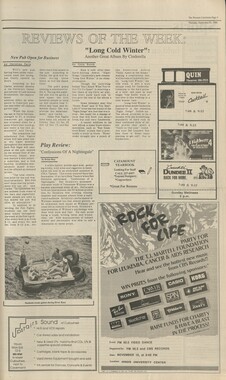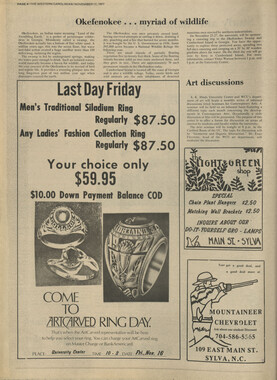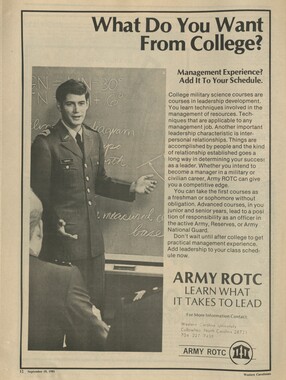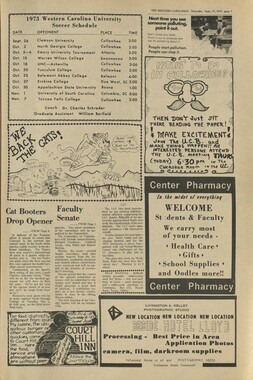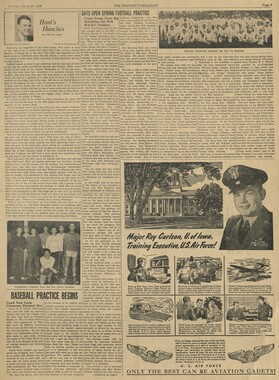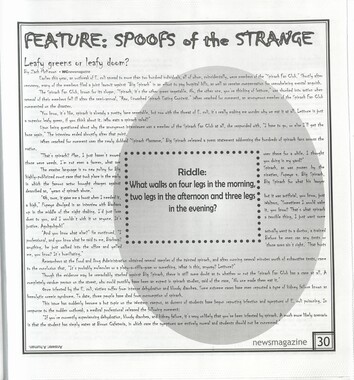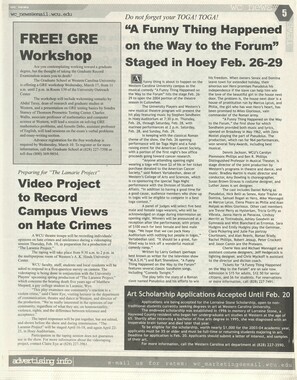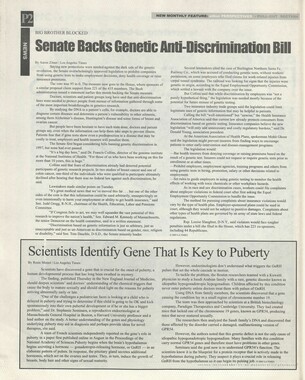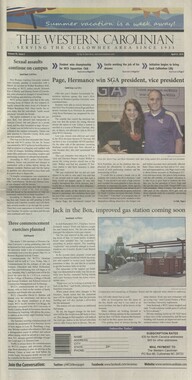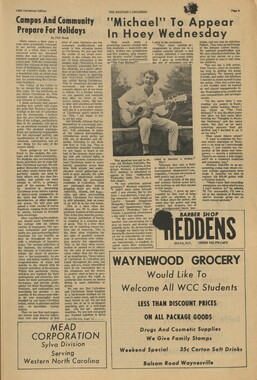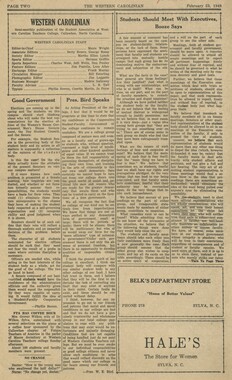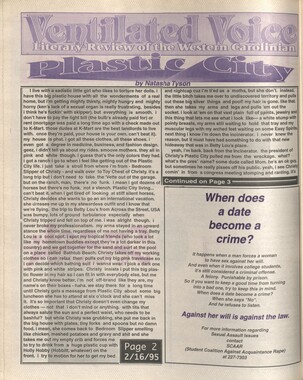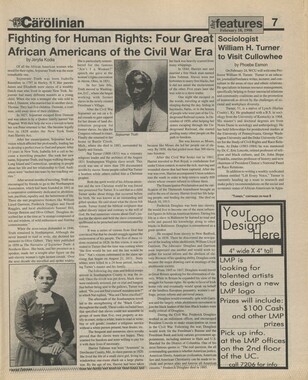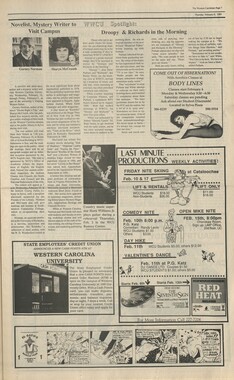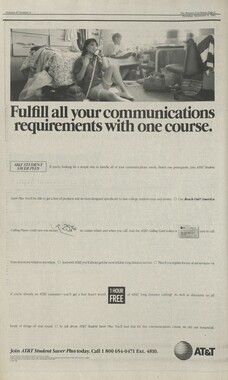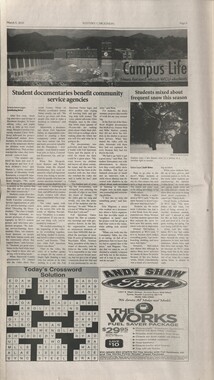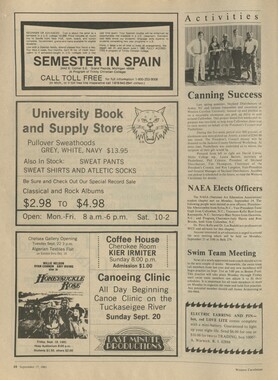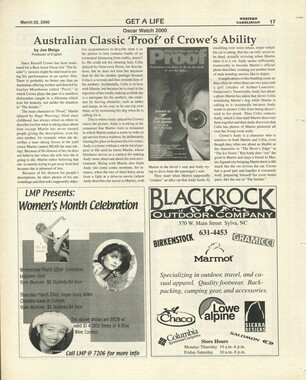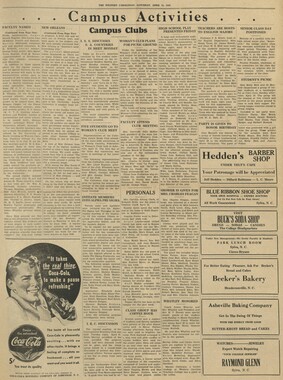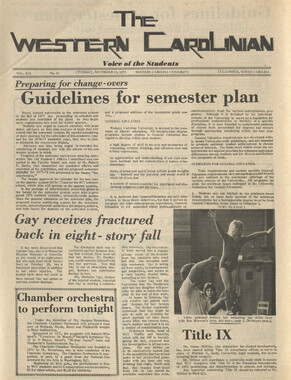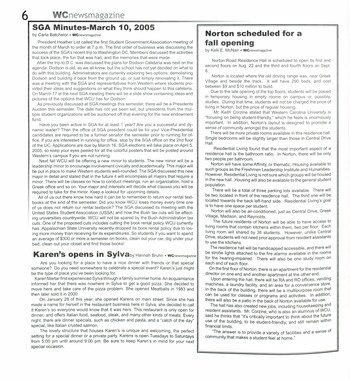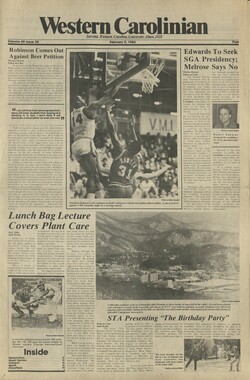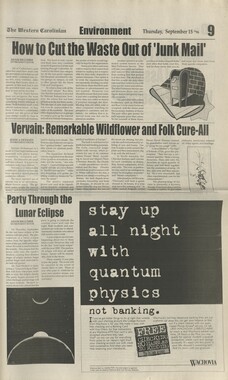Western Carolina University (20)
View all
- Canton Champion Fibre Company (2308)
- Cherokee Traditions (291)
- Civil War in Southern Appalachia (165)
- Craft Revival (1942)
- Great Smoky Mountains - A Park for America (2946)
- Highlights from Western Carolina University (430)
- Horace Kephart (941)
- Journeys Through Jackson (159)
- LGBTQIA+ Archive of Jackson County (85)
- Oral Histories of Western North Carolina (314)
- Picturing Appalachia (6873)
- Stories of Mountain Folk (413)
- Travel Western North Carolina (160)
- Western Carolina University Fine Art Museum Vitreograph Collection (129)
- Western Carolina University Herbarium (92)
- Western Carolina University: Making Memories (738)
- Western Carolina University Publications (2491)
- Western Carolina University Restricted Electronic Theses and Dissertations (146)
- Western North Carolina Regional Maps (71)
- World War II in Southern Appalachia (131)
University of North Carolina Asheville (6)
View all
- Allanstand Cottage Industries (62)
- Appalachian National Park Association (53)
- Bennett, Kelly, 1890-1974 (1463)
- Berry, Walter (76)
- Brasstown Carvers (40)
- Carver, George Washington, 1864?-1943 (26)
- Cathey, Joseph, 1803-1874 (1)
- Champion Fibre Company (233)
- Champion Paper and Fibre Company (297)
- Cherokee Indian Fair Association (16)
- Cherokee Language Program (22)
- Crowe, Amanda (40)
- Edmonston, Thomas Benton, 1842-1907 (7)
- Ensley, A. L. (Abraham Lincoln), 1865-1948 (275)
- Fromer, Irving Rhodes, 1913-1994 (70)
- George Butz (BFS 1907) (46)
- Goodrich, Frances Louisa (120)
- Grant, George Alexander, 1891-1964 (96)
- Heard, Marian Gladys (60)
- Kephart, Calvin, 1883-1969 (15)
- Kephart, Horace, 1862-1931 (313)
- Kephart, Laura, 1862-1954 (39)
- Laney, Gideon Thomas, 1889-1976 (439)
- Masa, George, 1881-1933 (61)
- McElhinney, William Julian, 1896-1953 (44)
- Niggli, Josephina, 1910-1983 (10)
- North Carolina Park Commission (105)
- Osborne, Kezia Stradley (9)
- Owens, Samuel Robert, 1918-1995 (11)
- Penland Weavers and Potters (36)
- Roberts, Vivienne (15)
- Roth, Albert, 1890-1974 (142)
- Schenck, Carl Alwin, 1868-1955 (1)
- Sherrill's Photography Studio (2565)
- Southern Highland Handicraft Guild (127)
- Southern Highlanders, Inc. (71)
- Stalcup, Jesse Bryson (46)
- Stearns, I. K. (213)
- Thompson, James Edward, 1880-1976 (226)
- United States. Indian Arts and Crafts Board (130)
- USFS (683)
- Vance, Zebulon Baird, 1830-1894 (1)
- Weaver, Zebulon, 1872-1948 (58)
- Western Carolina College (230)
- Western Carolina Teachers College (282)
- Western Carolina University (2008)
- Western Carolina University. Mountain Heritage Center (18)
- Whitman, Walt, 1819-1892 (10)
- Wilburn, Hiram Coleman, 1880-1967 (73)
- Williams, Isadora (3)
- Cain, Doreyl Ammons (0)
- Crittenden, Lorraine (0)
- Rhodes, Judy (0)
- Smith, Edward Clark (0)
- Appalachian Region, Southern (2569)
- Asheville (N.C.) (1923)
- Avery County (N.C.) (26)
- Blount County (Tenn.) (195)
- Buncombe County (N.C.) (1672)
- Cherokee County (N.C.) (283)
- Clay County (N.C.) (555)
- Graham County (N.C.) (236)
- Great Smoky Mountains National Park (N.C. and Tenn.) (519)
- Haywood County (N.C.) (3569)
- Henderson County (N.C.) (70)
- Jackson County (N.C.) (4912)
- Knox County (Tenn.) (35)
- Knoxville (Tenn.) (13)
- Lake Santeetlah (N.C.) (10)
- Macon County (N.C.) (420)
- Madison County (N.C.) (215)
- McDowell County (N.C.) (39)
- Mitchell County (N.C.) (132)
- Polk County (N.C.) (35)
- Qualla Boundary (982)
- Rutherford County (N.C.) (76)
- Swain County (N.C.) (2182)
- Transylvania County (N.C.) (270)
- Watauga County (N.C.) (12)
- Waynesville (N.C.) (86)
- Yancey County (N.C.) (72)
- Aerial Photographs (3)
- Aerial Views (60)
- Albums (books) (4)
- Articles (1)
- Artifacts (object Genre) (228)
- Bibliographies (1)
- Biography (general Genre) (2)
- Cards (information Artifacts) (38)
- Clippings (information Artifacts) (191)
- Copybooks (instructional Materials) (3)
- Crafts (art Genres) (622)
- Depictions (visual Works) (21)
- Design Drawings (1)
- Drawings (visual Works) (185)
- Envelopes (73)
- Exhibitions (events) (1)
- Facsimiles (reproductions) (1)
- Fiction (general Genre) (4)
- Financial Records (12)
- Fliers (printed Matter) (67)
- Glass Plate Negatives (381)
- Guidebooks (2)
- Internegatives (10)
- Interviews (815)
- Land Surveys (102)
- Letters (correspondence) (1013)
- Manuscripts (documents) (618)
- Maps (documents) (177)
- Memorandums (25)
- Minutes (administrative Records) (59)
- Negatives (photographs) (6090)
- Newsletters (1290)
- Newspapers (2)
- Notebooks (8)
- Occupation Currency (1)
- Paintings (visual Works) (1)
- Pen And Ink Drawings (1)
- Periodicals (193)
- Personal Narratives (10)
- Photographs (12976)
- Plans (maps) (1)
- Poetry (5)
- Portraits (4568)
- Postcards (329)
- Programs (documents) (181)
- Publications (documents) (2443)
- Questionnaires (65)
- Relief Prints (26)
- Sayings (literary Genre) (1)
- Scrapbooks (282)
- Sheet Music (2)
- Slides (photographs) (402)
- Songs (musical Compositions) (2)
- Sound Recordings (796)
- Specimens (92)
- Speeches (documents) (18)
- Tintypes (photographs) (8)
- Transcripts (322)
- Video Recordings (physical Artifacts) (23)
- Text Messages (0)
- A.L. Ensley Collection (275)
- Appalachian Industrial School Records (7)
- Appalachian National Park Association Records (336)
- Axley-Meroney Collection (2)
- Bayard Wootten Photograph Collection (20)
- Bethel Rural Community Organization Collection (7)
- Blumer Collection (5)
- C.W. Slagle Collection (20)
- Canton Area Historical Museum (2110)
- Carlos C. Campbell Collection (462)
- Cataloochee History Project (64)
- Cherokee Studies Collection (4)
- Daisy Dame Photograph Album (5)
- Daniel Boone VI Collection (1)
- Doris Ulmann Photograph Collection (112)
- Elizabeth H. Lasley Collection (1)
- Elizabeth Woolworth Szold Fleharty Collection (4)
- Frank Fry Collection (95)
- George Masa Collection (173)
- Gideon Laney Collection (452)
- Hazel Scarborough Collection (2)
- Hiram C. Wilburn Papers (28)
- Historic Photographs Collection (236)
- Horace Kephart Collection (861)
- Humbard Collection (33)
- Hunter and Weaver Families Collection (1)
- I. D. Blumenthal Collection (4)
- Isadora Williams Collection (4)
- Jesse Bryson Stalcup Collection (47)
- Jim Thompson Collection (224)
- John B. Battle Collection (7)
- John C. Campbell Folk School Records (80)
- John Parris Collection (6)
- Judaculla Rock project (2)
- Kelly Bennett Collection (1482)
- Love Family Papers (11)
- Major Wiley Parris Civil War Letters (3)
- Map Collection (12)
- McFee-Misemer Civil War Letters (34)
- Mountain Heritage Center Collection (4)
- Norburn - Robertson - Thomson Families Collection (44)
- Pauline Hood Collection (7)
- Pre-Guild Collection (2)
- Qualla Arts and Crafts Mutual Collection (12)
- R.A. Romanes Collection (681)
- Rosser H. Taylor Collection (1)
- Samuel Robert Owens Collection (94)
- Sara Madison Collection (144)
- Sherrill Studio Photo Collection (2558)
- Smoky Mountains Hiking Club Collection (616)
- Stories of Mountain Folk - Radio Programs (374)
- The Reporter, Western Carolina University (510)
- Venoy and Elizabeth Reed Collection (16)
- WCU Gender and Sexuality Oral History Project (32)
- WCU Mountain Heritage Center Oral Histories (25)
- WCU Oral History Collection - Mountain People, Mountain Lives (71)
- WCU Students Newspapers Collection (1923)
- Western North Carolina Tomorrow Black Oral History Project (69)
- William Williams Stringfield Collection (2)
- Zebulon Weaver Collection (109)
- African Americans (390)
- Appalachian Trail (35)
- Artisans (521)
- Cherokee art (84)
- Cherokee artists -- North Carolina (10)
- Cherokee language (21)
- Cherokee pottery (101)
- Cherokee women (208)
- Church buildings (189)
- Civilian Conservation Corps (U.S.) (111)
- College student newspapers and periodicals (2012)
- Dams (107)
- Dance (1023)
- Education (222)
- Floods (61)
- Folk music (1015)
- Forced removal, 1813-1903 (2)
- Forest conservation (220)
- Forests and forestry (1184)
- Gender nonconformity (4)
- Great Smoky Mountains National Park (N.C. and Tenn.) (181)
- Hunting (45)
- Landscape photography (25)
- Logging (119)
- Maps (83)
- Mines and mineral resources (8)
- North Carolina -- Maps (18)
- Paper industry (38)
- Postcards (255)
- Pottery (135)
- Railroad trains (72)
- Rural electrification -- North Carolina, Western (3)
- School integration -- Southern States (2)
- Segregation -- North Carolina, Western (5)
- Slavery (5)
- Sports (452)
- Storytelling (243)
- Waterfalls -- Great Smoky Mountains (N.C. and Tenn.) (66)
- Weaving -- Appalachian Region, Southern (280)
- Wood-carving -- Appalachian Region, Southern (328)
- World War, 1939-1945 (173)
Western Carolinian Volume 67 Number 16
Item
Item’s are ‘child’ level descriptions to ‘parent’ objects, (e.g. one page of a whole book).
-
-
One Person Can Make A Difference - Maybe Even Save Someone's Life hy is This Happeninhg in the 21st Century. nov. 20 - dec. 3, 2002 SUMMIT SHATTERS SCHOOL SAFETY MYTH ; SHARES LESSONS OF COLUMBINE TRAGEDY KEN UCKY ewsma azine news Some 600 school administrators, law enforcement officials, educators and students gathered Thursday, Nov. 14, at Western Carolina University to exchange ideas on how to combat the problem of violence in the nation's public schools. The most important step, according to several speakers at the daylong summit sponsored by the N.C. Governor's Crime Commission, is to realize it will take a collaborative effort among the schools, law enforcement, the court system, church and community to stem the tide of student violence. "There is a myth that we cannot do anything about school violence. The fact is, we can do a lot," Western Carolina Chancellor John W. Bardo said in remarks to open the summit, organized by the university's Public Policy Institute. "We seem to make these assumptions that bullying has been around forever, that it just happens. We seem to be saying, 'Well, society isn't what it used to be. The families are breaking down, and there's just not much we can do about it.' You all are coming together today to document that we can do something about it. You all are showing that, by working together, you believe we can create a better environment in our schools, and that taking action is far better than a passive, 'oh well."' Among the conference speakers was Marilyn Saltzman, who, as director of communication for the Jefferson County (Colo.) School System, was on the scene of the deadliest school shooting in U.S. history — Columbine High School, on April 20, 1999. "If there is one thing you take away from me today, it's this: Don't say it can't happen here. It can happen anywhere," Saltzman said, reminding the crowd that three- quarters of Columbine's student body went on to post-secondary education, and the school's average daily attendance rate was 95 percent. "Columbine was a suburban school full of high-achieving students. We didn't think anything like that could happen there. In her talk, titled "Lessons from the Columbine Tragedy," Saltzman urged the crowd to pay attention to potential early warning signs, such as bullying or other aggressive and harassing behavior. Recent research from the U.S. Secret Service and U.S. Department of Education indicates that the majority of perpetrators in past school shootings felt bullied, attacked or threatened by other students, she said. "We must create an atmosphere where kids feel safe to tell adults that someone acted in a way that threatened them," Saltzman said. "We all grew up in a world where you don't tattle, you don't rat. We live in a different world now. We need kids to tell us when they hear of things that worry them, when they think one of their classmates is having a problem." That's where the notion of community collaboration and intervention among schools, parents and community is so important, she said. "If you have a kid who is getting in trouble in school on Friday, at the mall on Saturday, and in church on Sunday, it is important that we can all talk together so that we can hopefully intervene on behalf of that student." George Sweat, secretary of the N.C. Department of Juvenile Justice and Delinquency Prevention, commended Western's Public Policy Institute for bringing together so many people from across North Carolina and adjoining states to work collaboratively. "The real success of this summit will be the exchange of information among participants about what is and what is not working. We need to make N.C. schools safer. Our schools are safe, but they are not as safe as we want them to be," Sweat said in the summit's keynote address. "For better or worse, like it or not, we really are inter-dependent, all of us — law enforcement, schools, courts, parents, students, the church and many, many others. We are in this together. We can't choose to ignore the problem. We cannot point fingers of blame at each other. We must do something about it. We must dare to share our collective knowledge about what works and what doesn't work. We need to knock down those turf walls that exist," he said. The summit consisted of three panels of experts examining issues of school violence, followed by panel discussions and recommendations for initiatives to improve school safety. A policy report will be issued at a later date. , Aimna Lawål has been sentencgd to death by stomtig in Nigeiia for having child ou€bfwedlock, essentially proof of adultery. Thé baby's father w.as set free after swearing on •tGe Koran that be never •bad sex witlllné!. Buried in a hole to 'her shoulders, people will start With smaller rocks, gfadually pumméiing her with larger sconeS and bricks •until sheis dea'd. A Stoning Can reportedly last as long as four 'hours. Curfeptjyin ,hiåing, Äminå Lawal was foi•ced to leave .hér foul Oldef children and tfavel from-place 'to place, with the help of humaifrights organizations. to avoid Citizens takifig the law intostheir own hand'u At befmost recent appeal 'in Court, Amina wept while the amen in the courtroom cheered as the judge upheld /her•death Sentence. The President of Nigeria has publicly condemned Amina's Sentence, but has not said that he •is going to stop it. The presidencand manysofthe central government are appalled and outraged by what is happening, butgthey 'too have strict Muslim Shari'ah laws of tfieir own wilich cannot be challengéd by the Central government: Militant'ihterpretacion of the Shari'ah laws is controVefsial, For the crime of theft, hands are amputated. People are publicly flogged .fof drinking alcohol or fornication. Yet' niånypeople support Shari'ah laws because they believetha€ 'common law has failed to adequately deter crime. Amnesty International says the Way XO put a stop to Amina's horrifying sentence is sto contact the Nigerian Ambassador of the United States. The Pi Gamma Chapter' of Delta Si ma Theta Sorority, Inc. has pre ared a letter addressed fo Ambassador Jitril Muhammad Aminu Of the Em assy of Nigeria 'in Washin ' ton, D.C. In conjunction wiih'thge WCU Women's Center and Last Minute Vfoductionsy Delta Sigma Theta would like to send this letter;g along with petition of over 6,000 signatures to the Nigerian-Embassy. Pleasestop by theqnformation table and srgn the petition. The table Will be Set up on the first floor Of the University Center from November "J 8 through 22 from 10:00 A. M. = 3:00 P.M. Information previded by Delta Sigma Thetav NOVEMBER 16 - by Robert Schenkkan 24 | WCU HOEY AUDITORIUM I CALL 227-7194 FOR MORE INFO
Object
Object’s are ‘parent’ level descriptions to ‘children’ items, (e.g. a book with pages).
-
The Western Carolinian is Western Carolina University's student-run newspaper. The paper was published as the Cullowhee Yodel from 1924 to 1931 before changing its name to The Western Carolinian in 1933.
-
